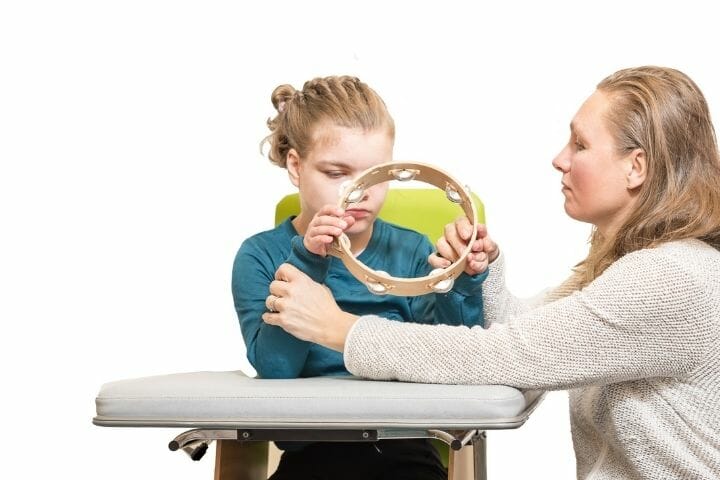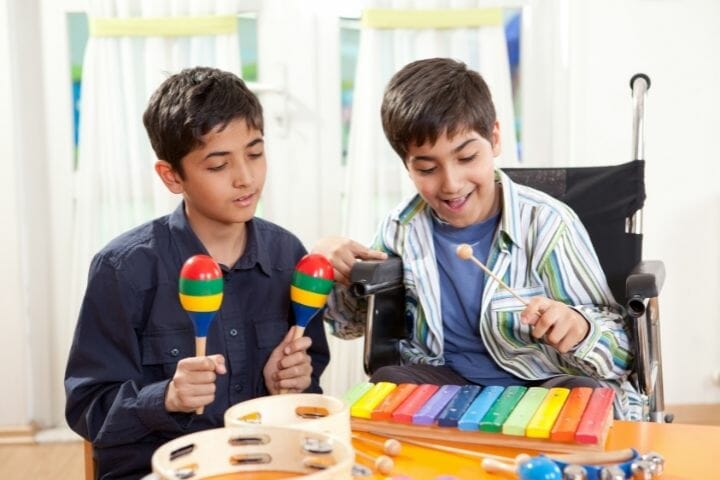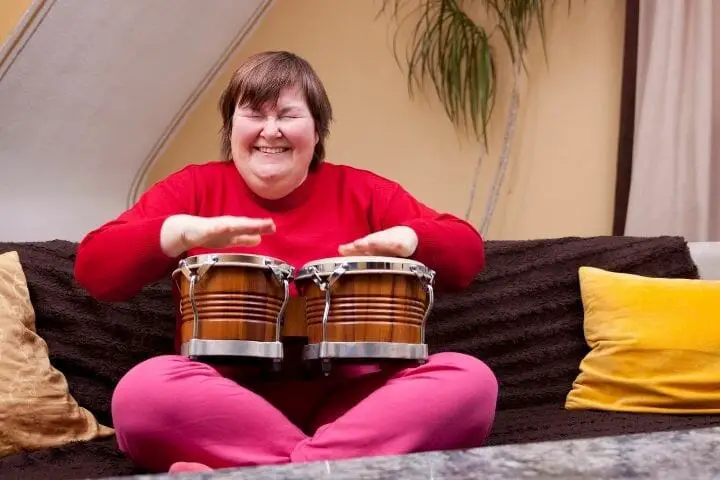Research has shown that alternative therapies can work well with Autism. How does music therapy help autism? Let’s find out
Contents
Music is a very basic human response and has a therapeutic effect. Hence, medical researchers have developed Music Therapy to help children with autism.
According to a study at the University of Montreal, Music Therapy makes children with autism engage in musical activities, including playing an instrument or singing, which can help their social communication skills. Music Therapy may also help children increase brain connectivity and improve the quality of life of their families.

The music is surprisingly linked with autism. Numerous research shows that music offers many benefits to children with autism. These autistic children have difficulty developing speech communication skills, but they can understand music well. Autistic individuals who use Music
Therapy show positive outcomes and remarkable progress in skill development. In this article, people can find many scientific studies explaining how Music Therapy helps children with Autism Spectrum Disorders.
What Is Music Therapy for Autism?
Music Therapy is the evidence-based utilization of music interventions to help people develop and accomplish their therapeutic goals. It is a unique yet powerful way to provide the individual with positive outcomes without any harm.
The music therapist uses music therapy to help people with disability or slower reacting ability and address their behavioral and communicative.
It enhances the quality of life of autistic people and helps them to develop communication skills. People with autism respond to music and show heightened interest in it.
The therapist believes it is an effective tool to work with autistic children and help them facilitate the development of their skills. Its primary focus is on improving the expressiveness of their inner emotional experiences such as anger, anxiety, grief, etc.
When therapists apply music as therapy, it helps children with autism regulate stress, as some experts believe that music therapy has a potential impact on their nervous system and cognitive functions.

How Does Music Therapy Help Kids With Autism?
American Music Therapy Association (AMTA) has promoted much research that supports the benefits of music therapy for people with diagnoses on the autism spectrum. The therapist focuses mainly on using music to address the following, including communication, behaviors, cognition, social skills, and emotional regulation. Music therapy helps children with autism in the following ways including:
- Music holds universal appeal. It connects people and their environment in a non-threatening setting. It provides aid in learning self-expression, facilitating relationships, and communication. Music is highly motivating and helps people to respond to their desire. It captures the attention of people and helps maintain it.
- Music therapy enhances multi-sensory as children with autism have complex sensory needs. It provides concrete, multi-sensory stimulation in the following areas, including visual, auditory, proprioceptive, tactile, and vestibular. These people may constantly seek stimulants of self-stimulation behaviors. Music can help children increase more appropriate responses and reduce their undesired behaviors.
- Music activates and is processed in the whole brain. Many research shows that when a person engages in music activities, the entire brain is affected and comes into action. When children listen to music, it activates neural networks responsible for emotions, motor control, and creativity in their brains. It can stimulate cognitive functioning and help the child remediate some speech or language skills.
- Music therapy can stimulate the child to reduce negative or self-stimulatory responses. It helps the child participate in a socially acceptable and more appropriate way.
- Music provides a musical structure that can create a sense of security and familiarity. The therapist uses a visual schedule with some children during music therapy sessions. Music also helps children with autism reduce the anxiety associated with new activities and transitions.
- Music therapy helps children to express themselves non-verbally and enable them without verbal language to communicate. The interpersonal timing and reciprocity in turn-taking, shared play, and listening to other people helps determine the styles of communication of children with autism.
- Music therapy utilizes innate strengths in the child with autism. Some children have perfect pitch and can pick out simple melodies by ear.
- Music helps communication with non-verbal. Music provides a way to self-expression without using words.
- Music therapy addresses motor, cognitive and social skills. Children can learn new things such as colors or numbers with these skills. Music therapist creates a program for children that effectively helps develop the targeted skills of the child.
- Music therapy also helps a person with autism to identify and express their emotions more freely.
- Music therapy can enhance the most sensory-motor, perceptual/motor because the rhythmic component of music is perfectly organized for children with autism.

How Effective Is Music Therapy for Autism?
Music therapy may help an autistic individual improve skills in areas such as social skills, communication, sensory issues, cognition, behavior, and self-reliance. Music engages and motivates many people, especially people with an autism spectrum disorder. Music therapy can help other people with sensory aversions to certain sounds.
According to a study, music therapy effectively helps children with autism to develop communication skills along with the following:
- Increased appropriate social behavior
- Increased vocalization
- Increased attention to a task
- Increased communication and social skills
- Increased verbalization, vocabulary, and gesture comprehension
- Enhanced body awareness and coordination
- Improved self-care skills
- Build stronger parent-child bonds
- Reduced anxiety
If your ASD child responds to music, it may be worth it for your child to receive music therapy.
You might like to read: Autism Recovery – Hope for Caregivers of ASD Kids
What Type of Music Helps Autism?
Generally, therapists use two different groups of music therapy for ASD children, including the active and the receptive or passive music therapy.
Therapists have been using music as therapy for a long time. Many studies show music benefits and impacts on an autistic individual. Most therapists use the receptive form of music for their autistic patients. In this type of music, the patient simply listens to music.
While the active form of music therapy, patients improvise with music to get the chance to express their feelings freely.
The music therapist takes notes of the moving body of a child with ASD and their pitch during a music therapy session. It helps them adjust the session according to the child’s condition. The therapist may use several musical instruments for a music therapy session.
The session length and setting may vary. The therapist may also involve the whole family of ASD patients in the sessions because it helps both child and family stabilize, maintain, and enhance their physical and mental health.

What Do Music Therapists Do?
Music therapists use qualification and clinical training to become trained professionals. They help people or individuals with a disorder treated with music therapy. They accept referrals of the client and observe their behavior and interactions. They help clients assess their emotional, behavioral, psycho-social, academic, cognitive, language, communication, perceptual, sensory, motor, and musical skills.
The therapist designs realistic and targeted goals according to their client’s needs. Therapists implement individualized music therapy programs with different procedures, strategies, and interventions to develop necessary skills. To live quality of life, people with autism need essential skills such as social and communication skills.
A skilled music therapist documents everything, including their client responses, progress of ongoing evaluation, and performance.
How To Find a Board-Certified Music Therapist for Kids With Autism?
If you are looking for a music therapist for your autistic child, you should get an excellent reputable music therapist. You should check the qualification when you select a music therapist, including:
- The therapist must earn a bachelor’s degree or higher in music therapy from an AMTA approved university or program.
- The therapist must have completed minimum clinical training of 1,200 hours.
- You can choose the therapist that has obtained the Music Therapist-Board Certified professional practice credential requirement.
- You can also choose the music therapists that work in school settings.
You should contact and hire a board-certified music therapist for your child. They can help in the treatment of your child with developmental disabilities. You can be a music therapist in public school systems as they provide significant motivation and assist society in achieving Individual Education Plan goals.
You can also find them in early intervention centers, daycare centers, Head Start programs, and various settings within the community.

How Do You Calm an Autistic Child at Night?
You can calm your autistic child using the following tips:
- You should avoid giving your child coffee and sugar as it is a stimulant.
- You should establish a nighttime routine for your child, including bathing them, reading a story, and putting them to bed.
- You can give your child a gentle back massage or let them listen to soft music before bed. Music therapy can work well too.
You might like to read: Respite Care For Autism
Wrap Up
If your child is suffering from ASD, you should consider music therapy as a medium to release their isolation and anxiety. You may get therapy for your child in a group or an individual setting. Using music therapy, the autistic kid can learn and practice skills in a playful way.
Music therapy effectiveness is linked with a good music therapist. A board-certified music therapist ensures the highest standard of care and helps your child experience joy in music and movement. It helps them improve their spontaneous self-expression.
We hope you enjoyed the article and would love to try out music therapy with your loved one. If you do try some of what we suggested, please share videos and pics with us, so that we can spread the message to others like you.
And please share this article on your social media boards and in your groups so that others can learn about this wonderful new therapy to help children who are struggling with ASD.
